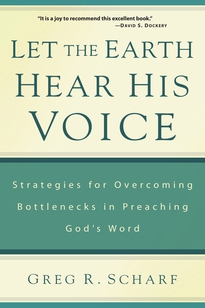This week’s author interview is with Greg Scharf. He is the author of our new release – Let the Earth Hear His Voice: Strategies for Overcoming Bottlenecks in Preaching God’s Word. You can read a sample chapter of his book by clicking HERE.

- Question #1 – Tell us a little bit about yourself: where you’re from, family, job, personal interests, unique hobbies, what you do in your spare time, etc.
I was born in Indiana but grew up in Texas from age 8. As a National Merit Scholar at Rice University, I studied biology and was accepted for doctoral work in physiology, but decided to take a year at a seminary to better equip myself to witness to peers in graduate school. I came to Trinity where I now teach and had so many questions answered that I stayed and completed the M.Div. There I met John Stott who taught one quad during my senior year. He invited me to do an internship at All Souls, Langham Place, in London England. That year turned into three and proved seminal in my ministry. I met my wife there and after three years in Toronto, Ontario, Canada, we moved to a newly planted Evangelical Free Church in Fargo, North Dakota where we enjoyed nineteen years of pastoral ministry.
- Question #2 – What inspired you to write this book, about this topic?
For the last 16 or so years I have been teaching a course called the “Theology and Methodology of Biblical Preaching”. That course forced me to hone my understanding of preaching and to undergird my practice of preaching with a defensible theology of preaching. I was a practitioner first and a bit more of a theorist second. During this time I conducted preaching seminars in various countries on behalf of Langham Preaching. Seeing the need of a basic book on the subject for those who would never take a course in homiletics, in 2005 I wrote Prepared to Preach: God’s Work and Ours in Proclaiming His Word. But for my master’s level students I needed something that interacted with other scholars and yet was practical and helpful. About this time I heard of the concept of the so-called “flipped course” where students are given all the content of the course to be studied on their own time and class times are not lectures but are devoted to activities and interaction that drive the truths home. Having read of Dr. David Pace’s work on learning bottlenecks, I recast the course as an exercise in how to get out of the way and let the Word of God get through the bottlenecks that too often constrict its flow to God’s people. That strategy required that I write the material in complete enough form that students could use it as part of this course. The basic writing happened in 2013 when I had a sabbatical and I have been refining and clarifying it since then. Trinity now has a digital distance course base on it which is the precise equivalent of the course I teach in Deerfield, so those are the ultimate field test of how clear Let the Earth Hear His Voice is!
- Question #3 – What book are you reading now?
I am reading Christopher Ash’s commentary on Job in the Preaching the Word series. I do not normally read commentaries from start to finish as a book but everything Ash writes is excellent and this volume is no exception.
- Question #4 – Do you have a favorite author? Who is it and why?
I would not list a favorite, but as someone who appreciates both content and clarity, I greatly value the writing of J.I. Packer. His Concise Theology is so clear and succinct that for several years when our sons were still at home, we read a chapter each day at the breakfast table as an introduction to theology for our boys.
- Question #5 – Do you have a favorite movie? What is it and why?
I enjoy “What About Bob?” because it wonderfully and hilariously exalts the humble and deflates the proud. If I begin to think too highly of my own writing, it helps to remember the scene where the psychiatrist in his office muses about which self-help book to recommend, only to turn to a shelf stocked only with multiple copies of his own book.
- Question #6 – Do you have a favorite quote? What is it and why?
In some respects, I could be considered the homiletical grandson of Charles Simeon the Cambridge preacher who ministered in the same church for 54 years late in the 18th and early 19th century. He greatly influenced John Stott who was my homiletical and pastoral mentor. He wrote the following to affirm his commitment to Scripture as opposed to any theological system:
“Perhaps you little thought in what you said against the golden mean, that you would carry me along with you. But I go even far beyond you, for to you I can say in words what these thirty years I have proclaimed in deeds, that the truth is not in the middle, and not in the extreme, but in both extremes.” “Here are two other extremes, Calvinism and Arminianism . . ‘How do you move in reference to these, Paul? In a golden mean?’ ‘No.’ – ‘to one extreme?’ ‘No.’ –‘How then?’ ‘To both extremes; today I am a strong Calvinist, tomorrow a strong Arminian.’ –‘Well, well, Paul, I see thou art beside thyself; go to Aristotle, and learn the golden mean.’ “But I am unfortunate; I formerly read Aristotle, and liked him much; I have since read Paul, and caught somewhat of his strange notions, oscillating (not vacillating) from pole to pole. Sometimes I am a high Calvinist, at other times a low Arminian, so that if extremes will please you, I am your man; only remember, it is not one extreme that we are to go to, but both extremes.”
- Question # 7 – What advice would you give to aspiring writers?
I don’t think of myself as a writer, so I would not presume to offer advice, but I did seek wisdom from those who are good writers. When I was a young associate pastor at Knox Church Toronto, I had the privilege of transporting speakers to and from the airport and enjoyed asking those who were writers this very question. Packer said, “Packer is the name, packer is the game. I aim for clarity, order economy.” Those three words stuck with me. Leon Morris said, “If I have five minutes, I use them.” Perhaps that is why he was so prolific.
How can readers discover more about you and your work?


Comments